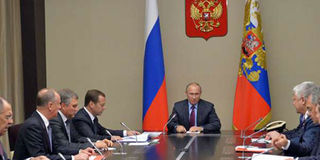US ties slump as war talk picks up in Russia

Russian President Vladimir Putin (centre) holds a session with the Russian Federation Security Council permanent members a the Novo-Ogaryovo residence outside Moscow on October 13, 2016.PHOTO | AFP
What you need to know:
- Washington suspended talks with the Kremlin on Syria; Moscow tore up a treaty on disposing weapons-grade plutonium; the West accused Russia and Syria of potential war crimes in its brutal attacks on rebel-held east Aleppo.
- The US then formally accused Moscow of hacking into American institutions computers to interfere in its November presidential election.
MOSCOW
State television threatens the West with nuclear weapons, the Kremlin halts a disarmament treaty, the military warns of shooting down United States fighter jets.
As ties between Russia and the West have once again slumped, war rhetoric in Moscow has peaked.
“Relations between Russia and the US in particular, and the West in general, have been dragged down to the bottom, to a level below which it is difficult to fall,” Konstantin Kalachev, the head of the Moscow-based Political Expert Group think tank, told AFP.
“But it wasn’t meant to be like this.”
Just over a month ago, Moscow and Washington inked an agreement to revive a ceasefire in Syria and the Kremlin seemed to have scored a tactical win by getting the United States to open the door to coordinate strikes against jihadist groups.
The deal — hammered out after repeated rounds of exhausting negotiations — appeared a potential breakthrough in Syria’s bloody civil war and years of bad blood and furious mudslinging between Moscow and Washington sparked by the Ukraine crisis.
Many, however, were sceptical that the Kremlin and the White House, on opposite sides in Syria, could begin to bury the hatchet — and so it proved.
Soon, the ceasefire collapsed and as the violence spiralled almost out of control. So did the ferocious acrimony.
Washington suspended talks with the Kremlin on Syria; Moscow tore up a treaty on disposing weapons-grade plutonium; the West accused Russia and Syria of potential war crimes in its brutal attacks on rebel-held east Aleppo.
The US then formally accused Moscow of hacking into American institutions computers to interfere in its November presidential election.
“Russia went further, turning a local breakdown in bilateral relations into a global one,” wrote Alexander Baunov from the Carnegie Moscow Centre.
As President Vladimir Putin suspended the plutonium deal, he slapped on a raft of staggering conditions for it to be restarted: Washington needed to pull back forces in eastern Europe, scrap sanctions and pay Moscow compensation.
“The kind of talk that Russian leaders have formerly kept to themselves has now burst into the open like a solar flare,” Baunov wrote.
Quickly, Russia’s slavish state TV and attack-dog spokespeople picked up the baton.
On his weekly Sunday night show, leading presenter Dmitry Kiselyov menaced that any aggression from the West towards Russia had a “nuclear dimension”.
Meanwhile, defence ministry spokesman Igor Konashenkov made a point of warning Washington that new defence systems Moscow had shipped to Syria meant that any unidentified aircraft flying overhead “will get a surprise”.
GEARING UP FOR WAR
Coincidence or not, the spike in rhetoric came as Russia held a series of events that seemed to suggest that the country was gearing up for war.
Across the country, the authorities said around 40 million people were taking part in civil defence drills, including fire alerts and evacuation of buildings.
Former Soviet Union leader Mikhail Gorbachev — who helped end the Cold War — warned that the world had reached a dangerous point.
“Modern day Russia is more ready, mainly psychologically, for a new spiral of confrontation with the West,” commentator Georgy Bovt wrote on Gazeta.ru outlet.
Baunov from Carnegie said the Kremlin seemed to be going harder after the latest fallout as it looked to strengthen its position in the period of flux before a new US president takes office.
“Russia decided not to wait to be punished by the US for meddling in its internal affairs and instead seized the initiative to push relations down to rock bottom,” he wrote.
But despite the surge in rhetoric, analyst Kalachev insisted that the situation was not as worrying as it was when ties first collapsed after Moscow’s seizure of Crimea from Ukraine in 2014.
“Back then, it was more scary — the rhetoric was taken seriously,” he said.
“Now President Putin is seen as just raising the stakes like an inveterate gambler, who bluffs and tries to take his partners for a ride.”
On Wednesday, in a sign that tensions could be dialled back, Moscow announced the first international talks on Syria with the US and key regional powers at the weekend.





